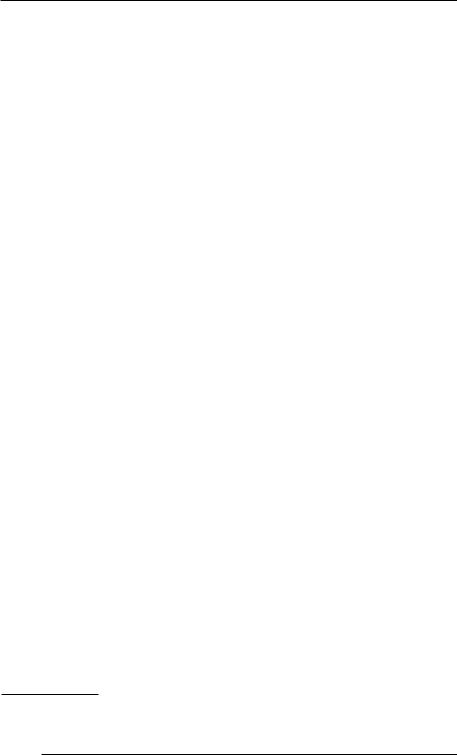
Brown Web of Debt The Shocking Truth about our Money System (3rd ed)
.pdf
Chapter 7 - While Congress Dozes in the Poppy Fields
fallen into foreign hands. Jefferson is quoted as saying:
If the American people ever allow the banks to control the issuance of their currency, first by inflation and then by deflation, the banks and corporations that will grow up around them will deprive the people of all property, until their children will wake up homeless on the continent their fathers occupied.
A similar wakeup call is attributed to Jackson, who told Congress in 1829:
If the American people only understood the rank injustice of our money and banking system, there would be a revolution before morning.
Jefferson was instrumental in Congress’s refusal to renew the charter of the first U.S. Bank in 1811. When the Bank was liquidated, Jefferson’s suspicions were confirmed: 18,000 of the Bank’s 25,000 shares were owned by foreigners, mostly English and Dutch. The foreign domination the Revolution had been fought to eliminate had crept back in through the country’s private banking system. Congressman Desha of Kentucky, speaking in the House of Representatives, declared that “this accumulation of foreign capital was one of the engines for overturning civil liberty,” and that he had “no doubt King George III was a principal stockholder.”1
When Congress later renewed the Bank’s charter, Andrew Jackson vetoed it. He too expressed concern that a major portion of the Bank’s shareholders were foreigners. He said in his veto bill:
Is there no danger to our liberty and independence in a bank that in its nature has so little to bind it to our country? . . . Of the course which would be pursued by a bank almost wholly owned by the subjects of a foreign power, . . . there can be no doubt. . .
Controlling our currency, receiving our public monies, and holding thousands of our citizens in dependence, it would be more formidable and dangerous than a naval and military power of the enemy.
Who were these “subjects of a foreign power” who owned the bank? In The History of the Great American Fortunes, published in 1936, Gustavus Myers pointed to the formidable British banking dynasty the House of Rothschild. Myers wrote:
Under the surface, the Rothschilds long had a powerful influence in dictating American financial laws. The law records show that they were the power in the old Bank of the United States.2
76

Web of Debt
Return of the King’s Bankers
Like the German Hanoverian kings, the Rothschild banking empire was British only in the sense that it had been in England for a long time. Its roots were actually in Germany. The House of Rothschild was founded in Frankfurt in the mid-eighteenth century, when a moneylender named Mayer Amschel Bauer changed his name to Amschel Rothschild and fathered ten children. His five sons were sent to the major capitals of Europe to open branches of the family banking business. Nathan, the most astute of these sons, went to London, where he opened the family branch called N. M. Rothschild & Sons. Nathan’s brothers managed N. M. Rothschild’s branches in Paris, Vienna, Berlin and Naples.
The family fortunes got a major boost in 1815, when Nathan pulled off the mother of all insider trades. He led British investors to believe that the Duke of Wellington had lost to Napoleon at the Battle of Waterloo. In a matter of hours, British government bond prices plummeted. Nathan, who had advance information, then swiftly bought up the entire market in government bonds, acquiring a dominant holding in England’s debt for pennies on the pound. Over the course of the nineteenth century, N. M. Rothschild would become the biggest bank in the world, and the five brothers would come to control most of the foreign-loan business of Europe. “Let me issue and control a nation’s money,” Nathan Rothschild boasted in 1838, “and I care not who writes its laws.”3
In 1811, when the U.S. Congress declined to renew the charter of the first U.S. Bank, Nathan Rothschild already possessed substantial political clout in England and was lending money to the U.S. government and certain States. “Either the application for renewal of the Charter is granted,” he is reported to have threatened, “or the United States will find itself in a most disastrous war.”4 When the charter was not granted, the United States did find itself in another war with England, the War of 1812.
War again led to inflation and heavy government debt. This and an inability to collect taxes were the reasons given for chartering the Second Bank of the United States as a private national bank. The twenty-year charter was signed by President James Madison in 1816. It authorized the Bank and its branches to issue the nation’s money in the form of bank notes, again shifting the power to create the national money supply into private hands.
77

Chapter 7 - While Congress Dozes in the Poppy Fields
Jefferson Realizes Too Late the Need for a National Paper Currency Issued by the Government
Jefferson was out of town when the Constitution was drafted, serving as America’s minister to France during the dramatic period leading up to the French Revolution. But even if he had been there, he would probably have gone along with the majority and voted to omit paper money from the Constitution. After watching the national debt mushroom, he wrote to John Taylor in 1798, “I wish it were possible to obtain a single amendment to our constitution . . . taking from the federal government the power to borrow money. I now deny their power of making paper money or anything else a legal tender.”5
It would be several decades before Jefferson realized that the villain was not paper money itself. It was private debt masquerading as paper money, a private debt owed to bankers who were merely “pretending to have money.” Jefferson wrote to Treasury Secretary Gallatin in 1815:
The treasury, lacking confidence in the country, delivered itself bound hand and foot to bold and bankrupt adventurers and bankers pretending to have money, whom it could have crushed at any moment.
Jefferson wrote to John Eppes in 1813, “Although we have so foolishly allowed the field of circulating medium to be filched from us by private individuals, I think we may recover it . . . . The states should be asked to transfer the right of issuing paper money to Congress, in perpetuity.” He told Eppes, “the nation may continue to issue its bills [paper notes] as far as its needs require and the limits of circulation allow. Those limits are understood at present to be 200 millions of dollars.”6
Writing to Gallatin in 1803, Jefferson said of the private national bank, “This institution is one of the most deadly hostility against the principles of our Constitution . . . . [S]uppose a series of emergencies should occur . . . . [A]n institution like this . . . in a critical moment might overthrow the government.” He asked, “Could we start toward independently using our own money to form our own bank?”
The Constitution gave Congress the power only to “coin money,” but Jefferson argued that Constitutions could be amended. He wrote to Samuel Kercheval in 1816:
Some men look at constitutions with sanctimonious reverence, and deem them like the ark of the Covenant, too sacred to be touched. They ascribe to the men of the preceding age a wisdom
78

Web of Debt
more than human, and suppose what they did to be beyond amendment . . . [L]aws and institutions must go hand in hand with the progress of the human mind. . . . [A]s that becomes more developed, more enlightened, as new discoveries are made, institutions must advance also, to keep pace with the times. . . .
We might as well require a man to wear still the coat which fitted him when a boy as civilized society to remain forever under the regimen of their barbarous ancestors.7
During the congressional debates over a Second U.S. Bank, Senator John Calhoun proposed a plan for a truly “national” bank along the lines suggested by Jefferson. A wholly government-owned national bank could issue the nation’s own credit directly, without having to borrow from a private bank that issued it. This plan was later endorsed by Senator Henry Clay, but it would be several more decades before the Civil War would provide the pretext for Abraham Lincoln to authorize Congress to issue its own money. The Second U.S. Bank chartered in 1816 was 80 percent privately owned.8
Jackson Battles the Hydra-headed Monster
Andrew Jackson was a hero of the War of 1812 and a leader with enormous popular appeal. He was the first of the “unlettered Scarecrows” to reach the White House, to be followed by the even mightier Abraham Lincoln (who actually looked like a Scarecrow). Jackson received an honorary degree from Harvard College in 1833, but it was over the objection of Harvard alumnus John Quincy Adams, who called him “a barbarian who could not write a sentence of grammar and hardly could spell his own name.” Perhaps; but “Old Hickory” truly believed in the will of the democratic majority, and he spoke to the common people in a way they could understand.
After the Federalists ceased to be a major national party, the Demo- cratic-Republicans dominated the political scene alone for a time. In 1824, four candidates ran for President as Democratic-Republicans from different States: Andrew Jackson, John Quincy Adams, William Crawford, and Henry Clay. Jackson easily won the popular vote, but he did not have enough electoral votes to win the Presidency, so the matter went to the House of Representatives, where Clay threw his support to Adams, who won. But popular sentiment remained with Jackson, who won by a wide margin against Adams in the election of 1828.
79

Chapter 7 - While Congress Dozes in the Poppy Fields
Jackson believed in a strong Presidency and a strong union. He stood up to the bankers on the matter of the bank, which he viewed as operating mainly for the upper classes at the expense of working people. He warned in 1829:
The bold efforts the present bank has made to control the government are but premonitions of the fate that awaits the American people should they be deluded into a perpetuation of this institution or the establishment of another like it.
Whether Congress itself had the right to issue paper money, Jackson said, was not clear; but “If Congress has the right under the Constitution to issue paper money, it was given them to be used by themselves, not to be delegated to individuals or to corporations.” His grim premonitions about the Bank appeared to be confirmed, when mismanagement under its first president led to financial disaster, depression, bankruptcies, and unemployment. But the Bank began to flourish under its second president, Nicholas Biddle, who petitioned Congress for a renewal of its charter in 1832. Jackson, who was then up for re-election, expressed his views to this bid in no uncertain terms. “You are a den of vipers and thieves,” he railed at a delegation of bankers discussing the Bank Renewal Bill. “I intend to rout you out, and by the eternal God, I will rout you out.” He called the bank “a hydra-headed monster eating the flesh of the common man.” He swore to do battle with the monster and to slay it or be slain by it.9
In the 1832 election, Jackson ran on the Democratic Party ticket against Henry Clay, whose party was now called the National Republican Party. Its members considered themselves “nationalists” because they saw the country as a nation rather than a loose confederation of States, and because they promoted strong nationbuilding measures such as the construction of inter-state roads. Clay advocated a strongly protectionist platform that kept productivity and financing within the country, allowing it to grow up “in its own backyard,” free from economic attack from abroad. It was Clay who first called this approach the “American system” to distinguish it from the “British system” of “free trade.” The British system was supported by Jackson and opposed by Clay, who thought it would open the country to exploitation by foreign financiers and industrialists. To prevent that, Clay advocated a tariff favoring domestic industry, congressionally-financed national improvements, and a national bank.
More than three million dollars were poured into Clay’s campaign, then a huge sum; but Jackson again won by a landslide. He had the
80

Web of Debt
vote of the people but not of Congress, which proceeded to pass the Bank Renewal Bill. Jackson as promptly vetoed it. Showing how eloquent the self-taught could be, he said in his veto bill:
There are no necessary evils in government. Its evils exist only in its abuses. If it would confine itself to equal protection, and, as Heaven does its rains, shower its favor alike on the high and the low, the rich and the poor, it would be an unqualified blessing. In the act before me there seems to be a wide and unnecessary departure from these just principles. Many of our rich men have not been content with equal protection and equal benefits, but have besought us to make them richer by act of Congress. . . . If we can not at once, in justice to interests vested under improvident legislation, make our Government what it ought to be, we can at least take a stand against all new grants of monopolies and exclusive privileges, against any prostitution of our Government to the advancement of the few at the expense of the many . . . .
Jackson succeeded in vetoing the bill, but he knew that his battle with the Bank was just beginning. “The hydra of corruption is only scotched, not dead,” he exclaimed. Boldly taking the hydra by the horns, he ordered his new Treasury Secretary to start transferring the government’s deposits from the Second U.S. Bank into state banks. When the Secretary refused, Jackson fired him and appointed another. When that Secretary refused, Jackson appointed a third. When the third Secretary proceeded to do as he was told, Jackson was triumphant. “I have it chained,” he said of the banking monster. “I am ready with screws to draw every tooth and then the stumps.” But Biddle and his Bank were indeed only scotched, not dead. Biddle used his influence to get the Senate to reject the new Secretary’s nomination. Then he threatened to cause a national depression if the Bank were not rechartered. Biddle openly declared:
Nothing but widespread suffering will produce any effect on Congress.
. . . Our only safety is in pursuing a steady course of firm [monetary] restriction – and I have no doubt that such a course will ultimately lead to restoration of the currency and the recharter of the Bank.
Biddle proceeded to make good on his threat by sharply contracting the money supply. Old loans were called in and new ones were refused. A financial panic ensued, followed by a deep economic depression. Biddle blamed it all on Jackson, and the newspapers picked
81

Chapter 7 - While Congress Dozes in the Poppy Fields
up the charge. Jackson was officially censured by a Senate resolution. The tide turned, however, when the Governor of Pennsylvania (where the Bank was located) came out in support of the President and strongly critical of the Bank; and Biddle was caught boasting in public about the Bank’s plan to crash the economy. In April 1834, the House of Representatives voted 134 to 82 against re-chartering the Bank, and a special committee was established to investigate whether it had caused the crash.10
In January 1835, in what may have been his finest hour, Jackson paid off the final installment on the national debt. He had succeeded in doing something that had never been done before and has not been done since: he reduced the national debt to zero and accumulated a surplus.i The following year, the charter for the Second Bank of the United States expired; and Biddle was later arrested and charged with fraud. He was tried and acquitted, but he died while tied up in civil suits.
Jackson had beaten the Bank. His personal secretary, Nicholas Trist, called it “the crowning glory of A.J.’s life and the most important service he has ever rendered his country.” The Boston Post compared it to Jesus throwing the moneychangers out of the Temple. But Jackson, like Jesus, found that taking on the moneychangers was risky business. “The Bank is trying to kill me,” he said, “but I will kill it!” He was the victim of an assassination attempt, but both the assassin’s shots missed.11
Abraham Lincoln would not be so lucky . . . .
i |
Recall that President Clinton’s balancing of the budget did not include |
|
|
paying off the national debt, which stood at $5 trillion in 2000. |
|
82

Web of Debt
Chapter 8
SCARECROW WITH A BRAIN: LINCOLN FOILS THE BANKERS
“With the thoughts you’d be thinkin’, “You could be another Lincoln,
“If you only had a brain . . . .”
– Dorothy to the Scarecrow (1939 film)
Like the Scarecrow who wound up ruling Oz, Abraham Lincoln went from hayseed to the top of his class by sheer native wit and determination, epitomizing the American dream. Fol-
lowing in the footsteps of Andrew Jackson, he rose from the backwoods to the Presidency without ever going to college. Lincoln’s mother could barely read. Like Jackson, Lincoln risked life and limb battling the Money Power; but the two Presidents had quite different ideas about how it should be done. Jackson had captured the popular imagination by playing on the distrust of big banks and foreign bankers; but in throwing out the national bank and its foreign controllers, he had thrown out Hamilton’s baby with the bath water, leaving the banks in unregulated chaos. There was now no national currency. Banks printed their own notes and simply had to be trusted to redeem them in specie (or gold bullion). When trust faltered, there would be a run on the bank and the bank would generally wind up closing its doors. Bank-fed speculation had collapsed much of the factory system; and federal support for road, canal and railway construction was halted, halting the pioneer settlement of the West along with it.
Lincoln was only 24 when he joined the fight as an Illinois state legislator to continue the pioneering internal improvements begun by Henry Clay and the National Republicans. The National Republicans were now called “Whigs” after the British Whigs, the party in opposition to the King. Jackson had taken such unprecedented powers to
83

Chapter 8 - Scarecrow with a Brain
himself that he had come to be called “King Andrew,” making the American opposition party Whigs by extension. The “Illinois Improvement Program” of Lincoln’s home state centered on construction of the Illinois-Michigan canal and a 3,000-mile railroad system. The result was an unbroken transportation line from the Hudson River to the Great Lakes and the Mississippi River. Lincoln also joined the movement to restore the country’s financial, industrial and political independence by restoring a national bank and a national currency.1
When the Whig Party disintegrated over the question of slavery, Lincoln joined the Republican Party, which was created in 1854 to oppose the expansion of slavery into Kansas. It opposed the political control exerted by southern slave owners over the national government; maintained that free-market labor was superior to slavery; promised free homesteads to farmers; and advanced a progressive vision emphasizing higher education, banking, railroads, industry and cities.2 Lincoln became the first Republican candidate to be elected President.
Both Jackson and Lincoln were targets of assassination attempts, but for Lincoln they started before he was even inaugurated. He had to deal with treason, insurrection, and national bankruptcy within the first days of taking office. Considering the powerful forces arrayed against him, his achievements in the next four years were nothing short of phenomenal. His government built and equipped the largest army in the world, smashed the British-financed insurrection, abolished slavery, and freed four million slaves. Along the way, the country managed to become the greatest industrial giant the world had ever seen. The steel industry was launched, a continental railroad system was created, the Department of Agriculture was established, a new era of farm machinery and cheap tools was promoted, a system of free higher education was established through the Land Grant College System, land development was encouraged by passage of a Homestead Act granting ownership privileges to settlers, major government support was provided to all branches of science, the Bureau of Mines was organized, governments in the Western territories were established, the judicial system was reorganized, labor productivity increased by 50 to 75 percent, and standardization and mass production was promoted worldwide.
How was all this accomplished, with a Treasury that was completely broke and a Congress that hadn’t been paid themselves? As Benjamin Franklin might have said, “That is simple.” Lincoln tapped into the same cornerstone that had gotten the impoverished colonists through the American Revolution and a long period of
84

Web of Debt
internal development before that: he authorized the government to issue its own paper fiat money. National control was reestablished over banking, and the economy was jump-started with a 600 percent increase in government spending and cheap credit directed at production.3 A century later, Franklin Roosevelt would use the same techniques to pull the country through the Great Depression; but Roosevelt’s New Deal would be financed with borrowed money. Lincoln’s government used a system of payment that was closer to the medieval tally. Officially called United States Notes, these nineteenth century tallies were popularly called “Greenbacks” because they were printed on the back with green ink (a feature the dollar retains today). They were basically just receipts acknowledging work done or goods delivered, which could be traded in the community for an equivalent value of goods or services. The Greenbacks represented man-hours rather than borrowed gold. Lincoln is quoted as saying, “The wages of men should be recognized as more important than the wages of money.” Over 400 million Greenback dollars were printed and used to pay soldiers and government employees, and to buy supplies for the war.
The Greenback system was not actually Lincoln’s idea, but when pressure grew in Congress for the plan, he was quick to endorse it. The South had seceded from the Union soon after his election in 1860. To fund the War between the States, the Eastern banks had offered a loan package that was little short of extortion – $150 million advanced at interest rates of 24 to 36 percent. Lincoln knew the loan would be impossible to pay off.4 He took the revolutionary approach because he had no other real choice. The government could either print its own money or succumb to debt slavery to the bankers.
The Wizard Behind Lincoln’s Curtain
Lincoln’s economic advisor was Henry Carey, the son of Matthew Carey, the printer and publisher mentioned earlier who was tutored by Benjamin Franklin and tutored Henry Clay. Clay was the leader of the Philadelphia-based political faction propounding the “American system” of economics. In the 1920s, historian Vernon Parrington called Henry Carey “our first professional economist.” Thomas DiLorenzo, a modern libertarian writer, has called him “Lincoln’s (and the Republican Party’s) economic guru.” Carey was known around the world during the Civil War and its aftermath, and his writings were translated into many European and Asian languages.
85
